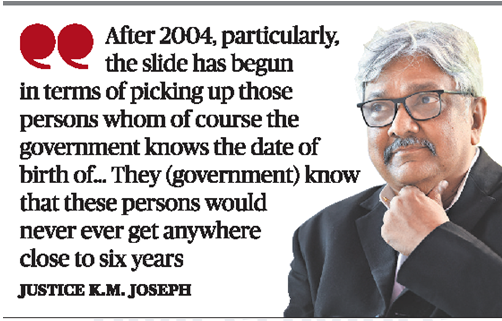- The Supreme Court on Tuesday said the government pays mere “lip-service” to the independence of the Election Commissioners and this is evident from the way the tenures of Chief Election Commissioners (CECs) have “slid” down from over eight years in the 1950s to just about a few hundred days after 2004.
- “Their (CECs) tenure is highly truncated and known from the very beginning… In this way, this so-called independence that you pay lip-service to, I am sorry to say, is completely destroyed by getting this kind of a term,” Justice K.M. Joseph, heading a Constitution Bench, addressed the Union government.
- Justice Joseph said the previous UPA government had six CECs in just eight years. “After the present government took over, from 2015 to 2022, for seven years, we have had eight CECs!” Justice Joseph, leading a five-judge Bench, addressed Attorney-General R. Venkataramani, appearing for the Centre.
- Justice Joseph said successive governments, particularly after 2004, have “picked” people whom it knew would “never ever” get close to the full term of six years prescribed under the Election Commission (Conditions of Service of Election Commissioners and Transaction of Business) Act of 1991. Section 4 of the 1991 Act says the term of a CEC and Election Commissioners is six years or till the age of 65, whichever is earlier.
- “This is a very, very, very disturbing trend! After 2004, particularly, the slide has begun in terms of picking up those persons whom of course the government knows the date of birth of… They (government) know that these persons would never ever get anywhere close to six years,” he observed orally.
- He said protections under Article 324, like removal through impeachment, available under the Constitution to the CECs would only be of any use if he or she had a full term.

SC calls out Centre over short tenures of CECs
- “All these protections you can avail of, provided you have the term… When you have a term of just 188 days or 160 days, what is the point?” Justice Joseph asked.
- Justice Joseph said the “most important” thing for a person heading an institution was a full term in office.
- “What is the most important thing for anybody at the helm of affairs of an institution? The time he gets to do what he wants to do,” Justice Joseph said. The judge said he had personally researched the tenures of all the CECs right from the first CEC Sukumar Sen, who served eight years and 273 days, till the 24th CEC Sushil Chandra, whose tenure was a little over a year.
- Justice Joseph passed on his research findings to the other judges of the Bench, Mr. Venkataramani and petitioners’ lawyers, senior advocate Gopal Sankaranarayanan and advocate Prashant Bhushan.
‘Checks and balances’
- The judge said the government needed to respond as to why there had been “no checks and balances” in the issue. He referred to the constitutional mechanisms prevalent in countries like Sri Lanka, Nepal, Pakistan and the United Kingdom in the appointment of Election authorities.
- The Constitution Bench is hearing a series of petitions seeking functional independence for Election Commissioners.
- The court is specifically examining the question of setting up an “independent, neutral mechanism”, outside the control of the government, for the appointment of Election Commissioners.
- Bhushan pointed out how the government had “hurriedly” appointed retired IAS officer Arun Goel as the third Election Commissioner shortly after the previous Constitution Bench hearing on November 17.
- In the last hearing, the court had orally remarked that a person appointed Election Commissioner could be completely honest, but may end up displaying a definite political leaning while in office.
SOURCE: THE HINDU, THE ECONOMIC TIMES, PIB
 Chinmaya IAS Academy – Current Affairs Chinmaya IAS Academy – Current Affairs
Chinmaya IAS Academy – Current Affairs Chinmaya IAS Academy – Current Affairs